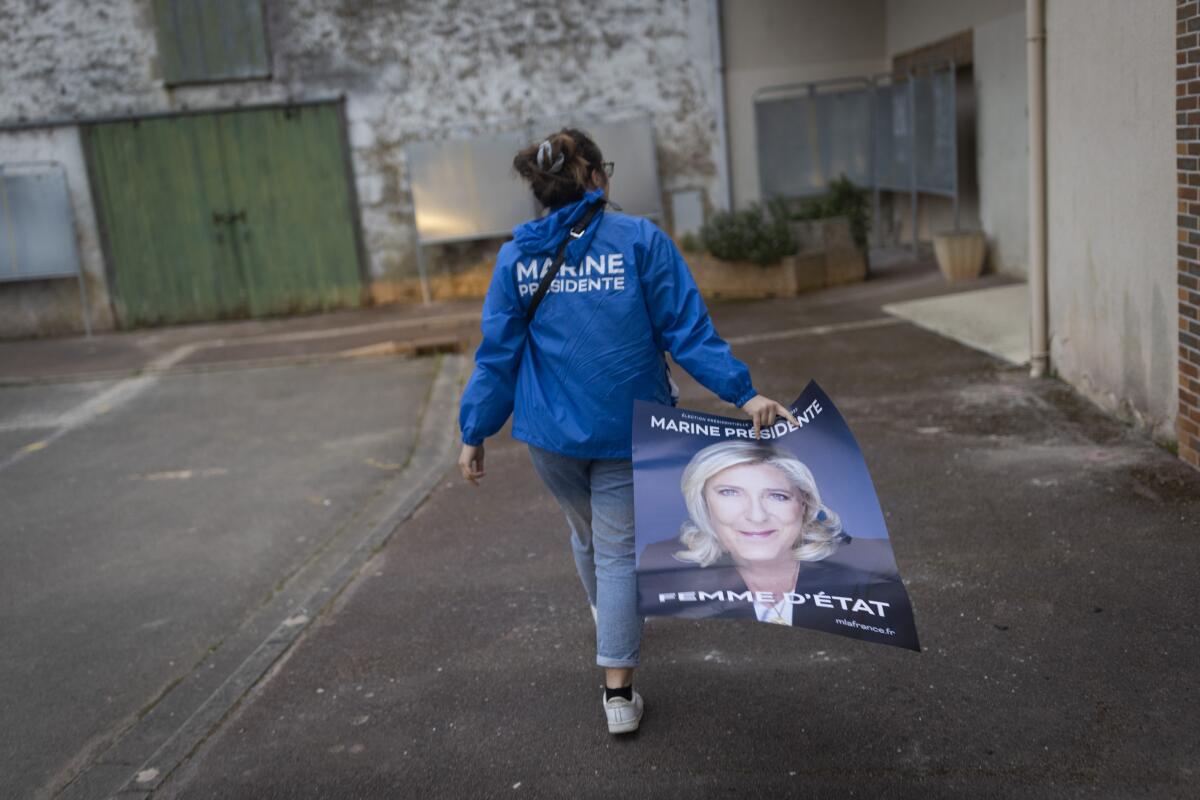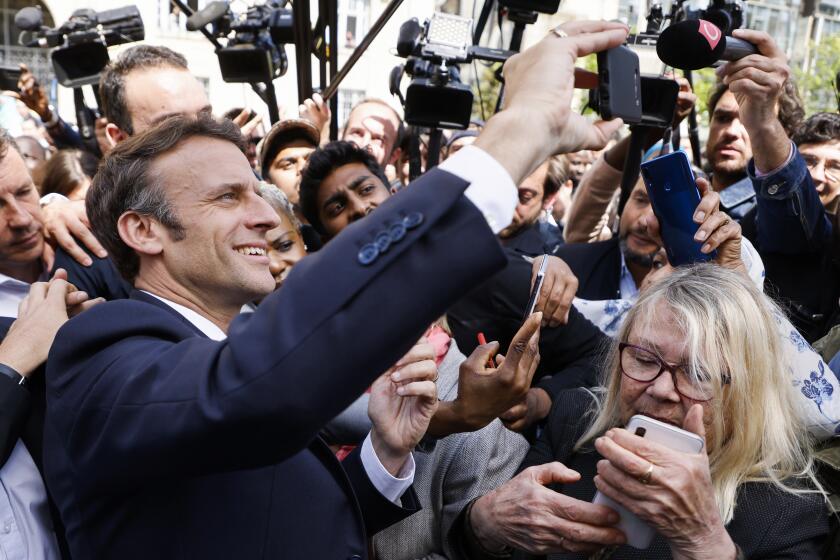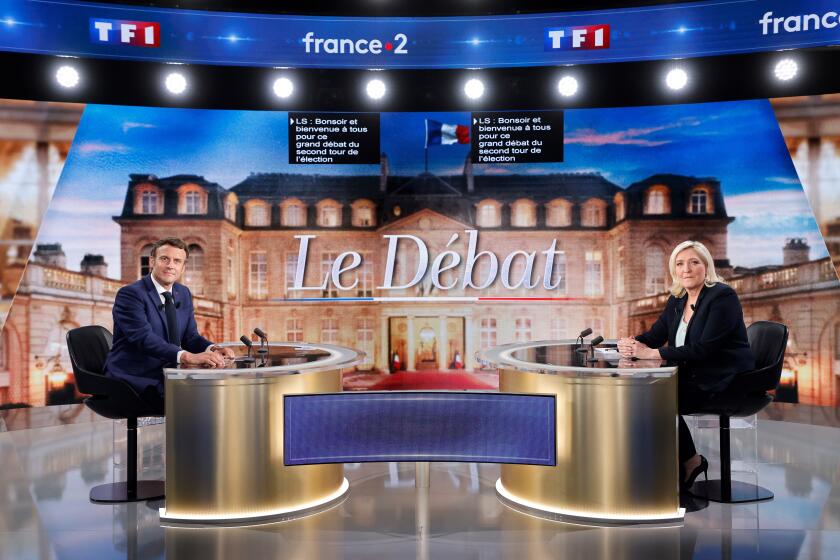Le Pen’s far-right vision: Retooling France at home and abroad

- Share via
PARIS — No more Muslim headscarves in public. All schoolchildren in uniforms. Laws proposed and passed by referendum. Generous social services unavailable to foreigners unless they’ve held a job for five years.
That’s just a sampling of Marine Le Pen’s vision for France if the far-right leader wins Sunday’s presidential runoff election against incumbent Emmanuel Macron. In all things, France, and the French, would come first.
Polls portray Macron as the front-runner in Sunday’s vote, but a Le Pen win is possible — an outcome that could rock France’s system of governance, strike fear among its immigrants and Muslims, jolt the dynamics of the 27-nation European Union and unnerve NATO allies.
Macron, 44, a centrist who is ardently pro-EU, has relentlessly blasted his adversary as a danger and framed their election showdown as an ideological battle for the soul of the nation. Le Pen, 53, views Macron as a progressive technocrat for whom France is just a “region” of the EU.
She says she would retool the country’s political system and the French Constitution to accommodate her populist agenda, putting the EU into second place and making France truer to its bedrock principles.
President Emmanuel Macron leads far-right candidate Marine Le Pen in the polls before Sunday’s vote, but her challenge has been unexpectedly strong.
“I intend to be the president who gives the people back their voices in their own country,” Le Pen said.
Critics fear a threat to democracy under Le Pen, a nationalist who is cozy with Hungary’s autocratic prime minister, Viktor Orban, and anti-immigrant far-right parties elsewhere in Europe. Le Pen met with Russian President Vladimir Putin before the 2017 French presidential vote that she lost to Macron in a landslide.
The United States has long considered France its oldest ally, but a Le Pen presidency could pose a problem for the Biden administration by undermining transatlantic unity over sanctions against Russia and by bolstering autocratic populists elsewhere in Europe.
The National Rally leader also is wary of free-trade deals and would seek a more independent stance for France in the United Nations and other multilateral bodies.
In a column Thursday in several European newspapers, the center-left leaders of Germany, Spain and Portugal all backed Macron, raising a warning about “populists and the extreme right” who hold Putin “as an ideological and political model, replicating his chauvinist ideas.”
French President Emmanuel Macron has torn into his far-right challenger Marine Le Pen in a television debate for her ties to Russia, among other things.
“They have echoed his attacks on minorities and diversity and his goal of nationalist uniformity,” wrote German Chancellor Olaf Scholz, Spanish Prime Minister Pedro Sánchez and Portuguese Prime Minister António Costa.
Le Pen’s meeting five years ago with Putin has haunted her campaign amid Russia’s war in Ukraine, even though she says she condemns the Russian invasion “without ambiguity.”
But if she were president, Le Pen said she would think twice about supplying Ukraine with weapons and would oppose energy sanctions against Moscow — for the sake of French pocketbooks and for the Russian people.
She also said that she would pull France out of NATO’s military command, weakening the Western military alliance’s united front against Moscow, and that there should be a “strategic rapprochement” with Russia once the war is over, echoing the past position of Macron, who has tried his own outreach with Putin.
Still, his government says it has sent more than $108 million in weapons to Ukraine since the war started, and France has been central to the West’s ever-tougher sanctions against Russia.
Le Pen has tried to project a nurturing image throughout her campaign, saying she would oversee France as “the mother of the family.” She has focused on the purchasing power of consumers while standing firm on emblematic issues that define the far right, such as immigration, security, national identity and sovereignty.
To soften the blow of rising prices, Le Pen says, she wants to slash taxes on energy bills from 20% to 5.5%. She promises to put $162 to $216 per month back in consumers’ pockets.
Macron, a former French economy minister and banker, considers such measures misdirected and economically unviable.
Le Pen contends that her agenda addresses the “France of the forgotten” that he has ignored.
She has proposed a “referendum revolution” as the centerpiece of her plan to help heal the “democratic fracture” that she says accounts for low turnout in recent French elections and growing social discord.
Laws could be passed by referendum — bypassing elected lawmakers — after supporters gather the signatures of 500,000 eligible voters. That was a demand of the “yellow vest” movement that challenged Macron’s presidency two years ago.
“During my mandate, I count on consulting the only expert that Emmanuel Macron never consulted — the people,” Le Pen said this month.
But there’s a hitch.
The French Constitution would need to be revised to give citizens such a direct voice in lawmaking. It would also need changing for another key Le Pen goal: giving a “national preference” for state housing and job benefits to French citizens before foreigners.
Macron failed in his own bid to change the constitution, a complicated process requiring support from both houses of Parliament. Le Pen wants to skirt that by using a special article in the constitution like Gen. Charles de Gaulle did in 1962 to allow for direct universal suffrage.
“She wants to dynamite liberal democracy by calling on the people,” four constitutional law professors wrote in the newspaper Le Monde.
Le Pen would use a referendum for other items in a controversial package to stop “uncontrolled immigration.”
These include treating any asylum demands abroad, not in France, and “systematically” expelling migrants without residency papers, among others; and ending automatic citizenship for those born in France to foreign parents.
She would also reinstate uniforms in all schools, and fortify police powers.
Le Pen has called Muslim headscarves “Islamist uniforms” and proposed a ban on wearing them in public. Macron said in a debate Wednesday night that such a ban could lead to “civil war” in the country that has Western Europe’s largest Muslim population.
But it was an elderly woman in a blue-and-white headscarf confronting Le Pen last week in the southern town of Pertuis who may have put a dent in her plan.
“What is the headscarf doing in politics?” she asked Le Pen.
After the confrontation by the woman, Le Pen party officials moved into damage control, saying that banning headscarves in streets would be progressive and not target a “grandmother of 70.”
Le Pen, nevertheless, said Friday on Europe 1 radio that “the role of grandmother is to protect their little granddaughters, and I ask them to help me.”
More to Read
Sign up for Essential California
The most important California stories and recommendations in your inbox every morning.
You may occasionally receive promotional content from the Los Angeles Times.












